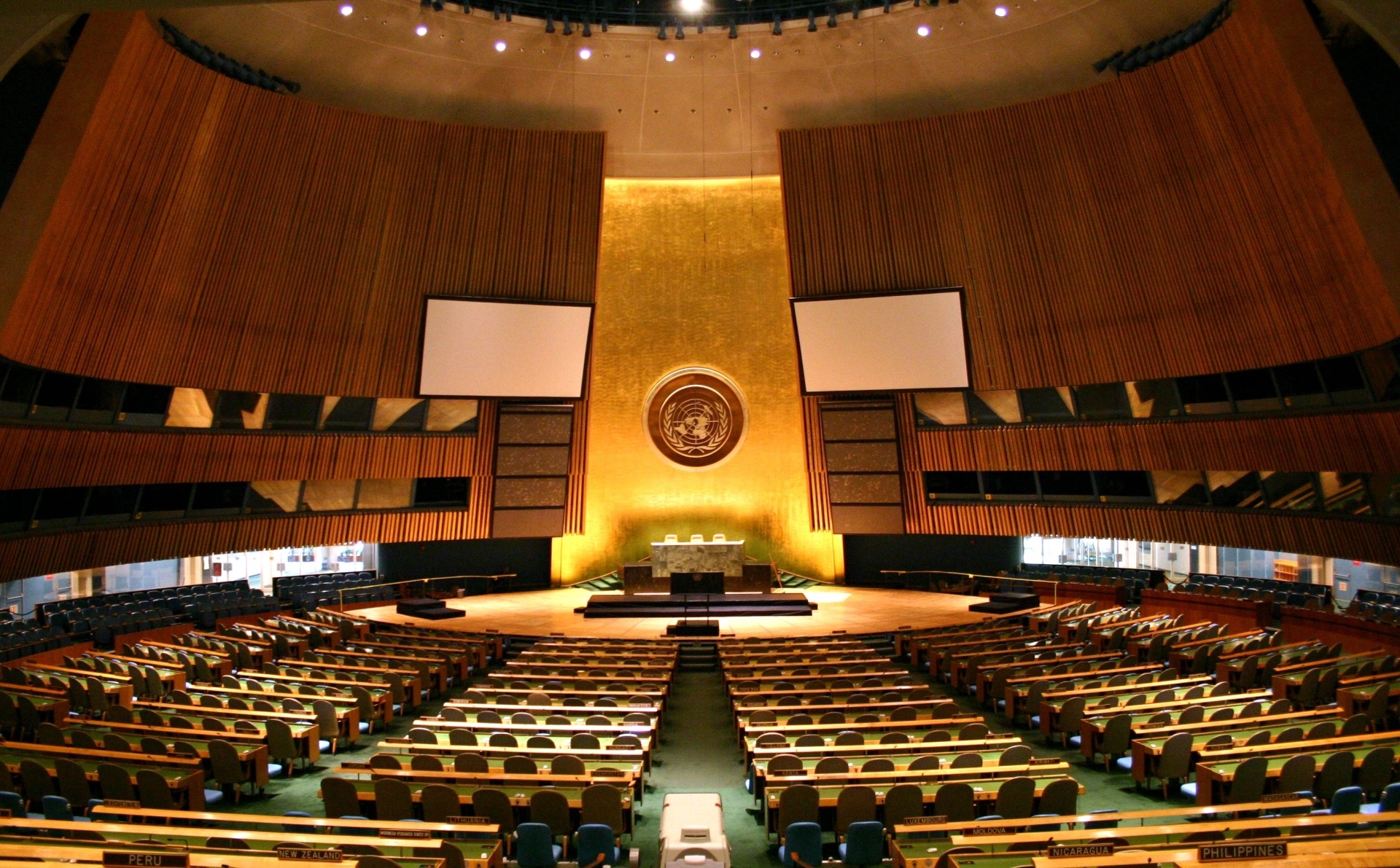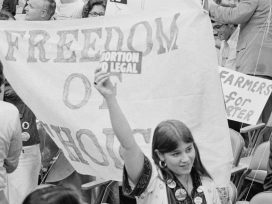Imagine that one man owned everything. Call him Croesus, after the king of ancient lore who, Herodotus says, was so ‘wonderfully rich’ that he ‘thought himself the happiest of mortals’. Impossibly elevated above his fellow men and women, this modern Croesus is also magnanimous. He does not want people to starve, and not only because he needs some of them for the upkeep of his global estate. Croesus insists on a floor of protection, so that everyone living under his benevolent but total ascendancy can escape destitution. Health, food, water, even vacations, Croesus dispenses them all.
In comparison with the world in which we live today, where many do not enjoy these benefits, Croesus offers a kind of utopia. It is the one many believe was foreseen in the Universal Declaration of Human Rights (1948), and it has become our own, with the rise in the past half-century of the international human rights movement – especially now that this movement has belatedly turned its attention to the economic and social rights that the declaration originally promised. In this utopia, it is no longer a matter of haves versus have-nots. The worst-off have enough. But they are in a yawning hierarchy, far beneath the have-mores.
We increasingly live in Croesus’s world. Tiny numbers of rich dwarf the rest in their wealth, and some national settings have been trending toward absolute inequality, even if the global picture is more complex. It now goes without saying that any enlightened regime respects basic civil liberties, though the struggle to provide them is unending. Croesus hates repression, not merely indigence. He would never consent to a police state; he views the atrocities of war and occupation with horror; he glows with outrage when the word ‘torture’ is mentioned. And he also considers it scandalous, even as the sole inhabitant of the top, to live in a world of destitution at the bottom. Croesus’s generosity, then, is as unprecedented as his wealth. How could anyone trivialize what Croesus has to offer?
Many of our ancestors would have demanded more. Any direct commitment to material equality – a ceiling on the wealth gap between rich and poor – is as absent from the Universal Declaration, as well as from the legal regimes and social movements that take it as their polestar, as it is from Croesus’s mind. Human rights guarantee status equality but not distributive equality. Nothing in the scheme of human rights rules out Croesus’s world, with its absolute overlordship, so long as it features sufficient provision of the good things in life.
In itself, Croesus’s provision of a floor seems deeply flawed – immoral even – if it coincides with some of the widest inequality ever seen. This is the point of the thought experiment: human rights, even perfectly realized human rights, are compatible with inequality, even radical inequality. Hard as it is to envision in practice, there is no contradiction between drastic material inequality and fulfilment of basic provision. Our question is whether we should continue to idealize Croesus’s world as we make our own world more like his every day.
From the short-lived Jacobin state to the mid-twentieth century welfare state in its North Atlantic, Latin American, and postcolonial versions, the political economy that accompanied the Universal Declaration of Human Rights committed nations to a new form of social life. It was a politics struggling to achieve sufficient minima for a wider set of privileged citizens than ever, as well as a modicum of socioeconomic equality among them. It was out of the experience of misery during the Great Depression and the solidarity of World War II, along with communist threat, that capitalist states signed on so enthusiastically to national welfare. For their parts, communist states in eastern Europe established welfare states of their own devising, and frequently socialist postcolonial states struggled to follow suit. Though ruined by gender subordination and horrid racism, it was the most materially egalitarian political economy modernity has seen. The late philosopher Derek Parfit recently claimed that it is best to sequence our commitments to build a minimum floor of protection and to institutionalize a ceiling on inequality. Starting with the one, in theory, by no means precludes reaching the other. But the lesson of the age of national welfare is that the struggle to advocate both sufficient protections and more equal outcomes is not to be sequenced but to be made simultaneous, in order to do justice to both, with all the difficulties that pursuing two ends at once inevitably involves.
The ideal of welfare never implied only protection for the weak. It condemned the libertarian premises of nineteenth-century capitalism and championed the state’s role to intervene for the sake of the common good, whether in the name of the reform of capitalism or communist revolution, Christian democracy or secular socialism. The consensus to moderate and reverse (though never eliminate) nineteenth-century inequality showed across the policy landscape, from antitrust to tax policy, not to mention state intervention into production or ownership of its means.
It is perhaps because human rights offered a modest first step of sufficient protection, rather than a grand final hope of material equality, that in the 1940s those rights were broadly ignored or rejected, or treated with anxiety, as the ultimate formulation of the good life. After all, rights talk had often been used to hem the state in rather than expand it. There were those who risked a call for ‘social rights’ in the era of the Universal Declaration. But that call took its meaning from the grand revision of the entitlements of citizenship for the sake of sufficiency and equality alike. Even Franklin Roosevelt, who offered a ‘Second Bill of Rights’ just as New Deal ambition died in his comparatively libertarian country, reserved the highest rhetoric not merely for adequate provision for the common man but a modicum of material equality through an end of ‘special privileges for the few.’

UN General Assembly hall. Photo: Patrick Gruban. Source: Flickr
Although many hoped that those ideals would span the globe, welfare needed to be organized nationally rather than internationally if it was going to spread – in stark contrast to the assumptions of both political economy and human rights as they prevail in our time. Everywhere in the world, welfare was both announced and achieved on a national basis. Of course, the Universal Declaration is international in source and form, but essentially as a template for nations – ‘a high standard of achievement for all peoples and nations,’ as its own preamble says. Welfare had been national ever since it emerged strongly during the crisis between the world wars. Governance of political economy ascended beyond the nation in the 1940s only for the sake of avoiding catastrophe if individual states failed in their obligation to manage their own national economies. It was never for the sake of a global floor of protection, let alone a global ceiling on inequality. The original relationship between the Universal Declaration and the political economy was thus a minimum set of guarantees for which experiments in national welfare should strive. The United Nations statement of rights coexisted with a more ambitious egalitarian project that it did not mention.
The search to pursue the twin campaigns against abjection and for equality succeeded only partially, whether measured by the extent of its success or the portion of the world’s peoples it benefited. There was, some hoped, the possibility of globalizing welfare, so as to seek the floor of protection and ceiling on inequality that some nations had achieved internally. Most visibly, developing nations proposed a ‘New International Economic Order‘ (NIEO) that explicitly aimed at global equity; its set of proposals had a moment of fame when the oil shock of 1973 stoked fears that the developed nations might face extractive prices for all commodities. Instead the ‘real new international economic order’ of market fundamentalism triumphed. Welfare states were perceived to be in crisis, undermined by their enemies and their own successes, and politicians were elected (or, in Latin America, took power) who set out to destroy the ideological consensus around national welfare. The legacy of the NIEO is that it is now impossible to imagine reverting to a world in which global material unfairness is ethically irrelevant. Otherwise, hopes were dashed and neoliberal dreams of a very different kind of global marketization came true.
After the 1970s, Croesus’s world came closer and closer to being a reality. To the extent that a utopia of justice survived, it was global but minimal, allowing for the worst state abuses to be decried. When it came to the distribution of the good things in life, the dream of sufficient protection prospered, but any commitment to policy constraints on material inequality evaporated. Status equality was given a major boost, overcoming the welfare state’s biases and exclusions, on grounds of gender and race, flaws that have made it not only irretrievable but also undesirable. Women’s rights, for example, became human rights, and multifarious subordination was challenged. But material hierarchy was frequently ratified and strengthened.
Whatever its potential in theory, the human rights movement adapted in practice to the new ambiance. For one thing, the idea of human rights followed the transformation of political economy to a global outlook. Further, activists no longer gave priority to the agency of states to launch and manage national welfare, but rather to the rights of individuals to be free from harm and to enjoy a rudimentary government that averts disaster and abjection. In the economic realm, social equality was forsaken as an ideal. In exchange for its cosmopolitanism, and in spite of some initial uncertainty, the new human rights movement foreswore any relationship to post-war egalitarianism in both theory and practice.
Despite the obvious objection that the Universal Declaration offers guarantees of sufficient provision against the worst miseries of free markets, the apparently tight chronological relationship between human rights and neoliberalism is tantalizing. Could the rise of human rights to the status of moral lingua franca really have nothing to do with the rise of market fundamentalism, or at least the decline of national welfare? The answer requires navigating between those who claim that human rights escape scot-free from the charge that they abet market fundamentalism and those Marxists who reply that human rights amount to little more than an apology for it. Conspiratorial accounts that view human rights as a dastardly accomplice of shifts in the global political economy are unconvincing, but the simple failures and limitations of human rights in the face of material unfairness are no less disturbing for it.
The real trouble about human rights when historically correlated with market fundamentalism is not that they promote it but that they are unambitious in theory and ineffectual in practice in the face of its success. Neoliberalism has changed the world, while the human rights movement has posed no threat to it. The tragedy of human rights is that they have occupied the global imagination but have so far contributed little of note, merely nipping at the heels of the neoliberal giant whose path goes unaltered and unresisted. And the critical reason that human rights have been a powerless companion of market fundamentalism is that they simply have nothing to say about material inequality. The chief worry about human rights is not that they destroy the very distributive protections they set out to afford, let alone that they abet ‘disaster capitalism’. In too many places, those protections never existed. And global capitalism is hardly the only or even the main source of state abuses. Indeed, there is no denying that after the 1970s, mainly thanks to Chinese marketization, more humans were brought out of the most extreme poverty – and thus above a basic threshold of subsistence— than by any prior force in history.
Rather, the problem is the one that Croesus’s example illustrates. Low ambitions, as much as the failure to realize them, are what have made human rights the companion of market fundamentalism, both experiencing their greatest strides in the same period. The chief connection between human rights and market fundamentalism is a missed connection. Precisely because the human rights revolution has focused so intently on state abuses and has, at its most ambitious, dedicated itself to establishing a guarantee of sufficient provision, it has failed to respond to – or even much recognize – neoliberalism’s obliteration of any constraints on inequality. Human rights have been the signature morality of a neoliberal age because they merely call for it to be more humane.
None of this is to say that human rights activism is irrelevant, any more than it would indict a hammer to say it is useless when another tool is needed. The stigmatization of states and communities that fail to protect basic values is – so long as it is not selective and a smokescreen for great power politics – an indubitable contribution. The rise of social rights in the last twenty-five years is certainly significant, however much most advocates and the most powerful states (led by the United States, which has consistently rejected economic and social rights as principles in the international system) prioritize political atrocity and repression for attention. Even when they are accorded more importance, however, social rights generally concern a threshold above indigence, not how far the rich tower over the rest.
‘In the absence of egalitarian pressure, it is clearer than ever that populist rage will explode in nations beset by increasing hierarchy and material stagnation.’
Unwittingly, the current human rights movement appears to be helping Croesus live out his plan. One might respond that material equality is someone else’s problem to make vivid and to organize to solve: it is not the job of one movement to build another. The coexistence of the human rights phenomenon with the death of socialism, however, is a historical fact that needs to be named. And for those activists and lawyers who have inherited the world’s stock of idealism in our day, there ought to be some shame in succeeding only amid the ruins of materially egalitarian aspiration at every scale. The human rights movement will even risk looking like an ally of Croesus – it has prospered as his rule has become more powerful – unless it does not engage in open dissidence against him, or at the very least connive with others who break into open rebellion. If human rights movements today focused even more than they do on social rights, for example, especially in the promotion of labour rights that functioned as mechanisms of collective empowerment, it might make a significant difference to material outcomes.
In the absence of egalitarian pressure, it is clearer than ever that populist rage will explode in nations beset by increasing hierarchy and material stagnation. Similarly, persistent global inequality creates permanent incentives for migration, exacerbating refugee crises and converting penury from a structural evil to a visible spectacle. The response of human rights movements has been to double down on their strengths, indicting the consequences of material inequality when it leads to political catastrophe. But if it does not save itself from its peaceable companionship with neoliberalism, the human rights movement looks more and more like a palliative that accepts the permanence of recurrent evil without facing it more frontally. Populism is only one example of the dynamic of ignoring the disease, only to denounce the symptoms.
Could a different form of human rights law or movements correct for their coexistence with a crisis of material inequality? There is reason to doubt that they can do so by changing radically – for example by transforming into socialist movements. There is no contradicting the moral significance and possibly even historical success of human rights when it comes to combating political repression and restraining excessive violence or indeed, though more controversially, in campaigns for economic and social rights. But whenever inequality has been limited, it was never on the sort of individualistic, and often anti-statist, basis that human rights share with their market fundamentalist Doppelgänger. And when it comes to mobilizing support for economic fairness, the chief tools of the human rights movement – playing informational politics to stigmatize the repressions of states or the disasters of war – are simply not fit for use. It is in part because the human rights movement is not up to the challenge that it has been condemned to offer no meaningful alternative, and certainly no serious threat, to market fundamentalism. In Herodotus’s Histories, the philosopher Solon’s shaming of Croesus merely took the king down a peg. It was Persian armies that toppled him. The truth is that local and global economic justice requires redesigning markets or at least redistributing from the rich to the rest, something that naming and shaming are never likely to achieve, even when supplemented by novel forms of legal activism.
Not that neoliberalism dispensed with the state – far from it. But from the Jacobins on, a very different kind of state than it has brought about surged in the imagination, in the guise of saviour of the people, attracting its devotion and self-sacrifice. Like neoliberalism, human rights movements depend on the state. But their pursuit of economic and social rights has done nothing to build state capacity to achieve them, or stoke the will to do so. In the alternative tradition of welfare, which combined the aims of sufficiency and equality, it was the strong state – built with interventionist capacities, funded by high taxes, and able to call forth the zeal of its people – that served as the equalizing power. Equality was never achieved by stigmatizing governance, but instead by enthusiasm for it, even devotion to it. Before the New International Economic Order died, the movement for global equality was a governmental rather than non-governmental one, for the sake of building new institutions rather than stigmatizing existing ones alone. Global welfare would require the same emotional commitment to the governmental capacity, scaled all the way up from its avatar in national welfare to the world stage. Croesus, like the human rights movement, is correct that there is no way to proceed state by state without the whole world in view. It is just that neither adopts equality in distribution as a compelling norm.
‘If a dream of welfare is ever to be brought from the realm of the ideal, where it is currently exiled, it will need to be championed not only as a program but also by a movement.’
But there is a deeper reason than its diffident relation to programmatic thinking and state power to believe that the human rights movement cannot disrupt its companionship with neoliberalism simply by pivoting to equality. More disturbingly, it can be no accident that the era of relative material equality in the mid-twentieth century was also the age of totalitarian regimes and of the Cold War, which exacted an appalling toll on the world. National welfare built a floor of protection and a ceiling on inequality only in the presence of frightening internal and external threats – a prominent and well-organized labour movement and a communist menace, however magnified out of proportion. In response to those dangers, change came thanks to what Pierre Rosanvallon has called a ‘reformism of fear’. Governance expanded to secure material equality because the state was viewed as less frightening than the threats only it could stave off. By contrast, the human rights movement at its most inspiring has stigmatized governmental repression and violence, but has never offered a functional replacement for the sense of fear that led to both protection and redistribution for those left alive by the horrors of the twentieth century.
If a dream of welfare is ever to be brought from the realm of the ideal, where it is currently exiled, it will need to be championed not only as a program but also by a movement. But it will not look like our human rights movement. Above all, it will need to take on the task of governance, local and global, and not critique alone. And it will need to be frightening enough to prompt the social bargains that the welfare state supervised to the end of material fairness, while not incurring the tremendous costs of twentieth century conflict. The age of human rights has involved greater inclusion in national social justice, especially for women, and any new programme and movement will need to preserve and extend those gains. Finally, it will need to be global in scale. On moral grounds, the wealthy in the world should want to save themselves from narrow identification with their fellow humans only when their lives are at stake in the most spectacular displacement, penury and violence. To date, a global welfare structure has only been imagined but never institutionalized. Our job is, therefore, not an easy one. Indeed, it is daunting in the extreme.
But there is no reason to think that material equality necessarily depends on either exclusion or violence, or as if a bold programme of international fairness is a pipe dream. For a generation, it has been familiar to think that human rights are the essential bulwark against atrocity and misrule, and no one should trivialize their importance. But it is time to relearn the older and grander choice between socialism or barbarism, and elevate it to the global project it has rarely been but must become. Croesus’s world of basic rights and needs fulfilled in the midst of continuing or even escalating inequality is not only still immoral. It has become clearer every day that it is destined to instability and ruin.
Human rights emerged as the highest morality of an unequal world, under neoliberal circumstance its partisans struggled to humanize, only to find themselves accused of complicity with it. Human rights activists should not desire that companionship even if they decide that their role is not to argue for equality. More important, their audience should not believe human rights are the only or even the main keys to unlock the portal to the world’s future. Human rights will return to their defensible importance only when humanity saves itself from its low ambitions. If so, for the sake of local and global welfare, sufficiency and equality can again become powerful companions, both in our moral lives and in our political enterprises.







